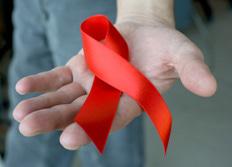HIV and good nutrition

 Loss of weight and loss of energy are common problems for HIV-positive people. But a healthy diet and exercise can help improve their quality of life.
Loss of weight and loss of energy are common problems for HIV-positive people. But a healthy diet and exercise can help improve their quality of life.
‘It is more important for people living with HIV because HIV has a negative effect on nutrition. If the immune system is not functioning well, that gives HIV even more opportunities to multiply and cause illness in the body. So, an HIV-positive person must take nutrition as a serious matter in their lives’, says Dr. Limakatso Lebina, of central Johannesburg’s Zuzimpilo Clinic.
She says a balanced healthy meal does not have to be costly.
‘The old African food is usually the best. Your pap and vegetables are good nutritious food. A balanced diet consists of your carbohydrates, a big focus on vegetables and proteins’¦ proteins does not necessarily mean meat. Your beans, peanuts, cheese, milk’¦ that’s good nutritious meals. That’s not that costly’, says Dr. Lebina.
She says exercising is also important for HIV-positive people because they often lose weight, especially their muscle mass. On the other hand, she points out that obesity is also on the rise among HIV-positive people.
‘Obesity is also a problem among HIV-positive people, as it is an increasing problem in South Africa. It does not necessarily mean if you are obese you’re healthy and you have normal nutrition. Exercise is important to keep the body mass low and increase muscle weight. Exercise does not have to happen in the gym. Working in the vegetable garden is exercising, walking the child to school, and just running up and down your house 30 minutes is exercising – as long as it is done regularly’, says Dr. Lebina.
Dr Lebina warned against a trend where HIV-positive people have deliberate intentions to gain weight.
‘Unfortunately, the stigma that came with HIV is something that we’re still working on.
It has always been thought that those that are thin are the ones that are HIV-positive and those that are fat and heavy-weight are the ones that are well. However, we all know that you cannot diagnose HIV by looking at the person’, says Dr. Lebina.
Frieda Nxisana, a nursing manager at Cotlands, a safe home for HIV-positive and abandoned children, warned against eating fatty foods. She says foods that are high in fat prevent antiretroviral medication from working.
‘When you give a child a diet that is high in fat, that fat will prevent the ARVs from being absorbed in the stomach’, says Nxisana.
She also warned against convenience foods, saying that they may contribute to the HIV disease progression.
‘In our community we have kotas. A kota is bread that they put chips and achaar in. All these things have fat and fat prevents the absorption of ARVs. But if you can take that bread and put beans inside and serve it like that, a person gets a nutritious meal instead. A snack of a fruit is much better than a snack of chips. And also drinking water is the best, especially for children’¦ plain water is the best’, says Nxisana.
Nxisana advised families with HIV-positive people to buy nutritious meals that can be enjoyed by everyone in the family, including children.
‘Whatever diet you put together, it’s easy when it’s a diet that can be eaten by an adult as well as a child. For example, Nespray milk’¦ an adult can take Nespray in her tea, and a child will take Nespray as a drink’, says Nxisana.
Author
Republish this article
This work is licensed under a Creative Commons Attribution-NoDerivatives 4.0 International License.
Unless otherwise noted, you can republish our articles for free under a Creative Commons license. Here’s what you need to know:
You have to credit Health-e News. In the byline, we prefer “Author Name, Publication.” At the top of the text of your story, include a line that reads: “This story was originally published by Health-e News.” You must link the word “Health-e News” to the original URL of the story.
You must include all of the links from our story, including our newsletter sign up link.
If you use canonical metadata, please use the Health-e News URL. For more information about canonical metadata, click here.
You can’t edit our material, except to reflect relative changes in time, location and editorial style. (For example, “yesterday” can be changed to “last week”)
You have no rights to sell, license, syndicate, or otherwise represent yourself as the authorized owner of our material to any third parties. This means that you cannot actively publish or submit our work for syndication to third party platforms or apps like Apple News or Google News. Health-e News understands that publishers cannot fully control when certain third parties automatically summarise or crawl content from publishers’ own sites.
You can’t republish our material wholesale, or automatically; you need to select stories to be republished individually.
If you share republished stories on social media, we’d appreciate being tagged in your posts. You can find us on Twitter @HealthENews, Instagram @healthenews, and Facebook Health-e News Service.
You can grab HTML code for our stories easily. Click on the Creative Commons logo on our stories. You’ll find it with the other share buttons.
If you have any other questions, contact info@health-e.org.za.
HIV and good nutrition
by siphosethustuurman, Health-e News
December 5, 2011



